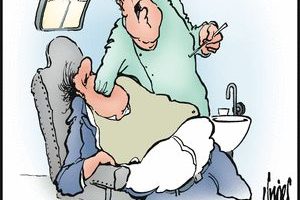For three weeks I lay immobilized...
Read More
The Prescient Pre-Trumpian Dental Fiasco


For three weeks I lay immobilized...
Read More

Although I don’t look forward to going to the dentist, I do appreciate the importance of the work–maybe because I have always had dental issues, from cavities to crowns, partial plates and bridges to implants, orthodontia to tooth extraction. Much of it is thanks to genetics, which forgot to provide me a full secondary set of teeth and even now has left a few baby teeth hanging on by a thread. I envy those with naturally beautiful teeth but have been fortunate to be able to get dental care to make the best of the situation.
When I worked in the community health centers in Alameda County, it was a great source of pride that we included dental care services—of course cobbled together with great difficulty through grants and special programs. In fact, my clinic ended up taking over the dental services at the local children’s hospital because it was such a money-loser for them, and we could leverage other resources. I learned about how preventive care for children could change lives, and how poor dentition could affect overall physical and emotional health at all ages. Heart disease, diabetes control and poor pregnancy outcomes have all been linked to oral health; trying to find job or a relationship with diseased and absent teeth is a real challenge. And yet dental care is at best an “add-on” for most health systems, and very expensive to access. Nothing establishes your social standing as visibly as bad teeth.
There are historical reasons why medical, dental, eye, maternity, public health and mental health services evolved in their silos, but it is pretty clear that true health is more holistic than that (and includes the “social determinants of health”). In my utopian fever dreams, there is no doubt that everyone would get the dental care they need.

We were looking for somewhere to buy a boom box to play CD music for our elopement ceremony in Niagara Falls, and someone suggested Canadian Tire. Incredulous, we had to ask why an automotive service center would have such a thing and were met with an amused look and explanation that the store carried much more than tires. And indeed, it had apparently morphed into a big box with garden center, sports equipment, kitchen items, furniture, cleaning supplies, seasonal items, and electronics. They also gave us Canadian Tire dollars with each purchase.
The dollars sported the face of a man with moustache and plaid tam, connoting a thrifty Scot (google tells me he was “Sandy McTire”). They came in small denominations of a few cents up to a dollar, a tiny fraction of the value of your purchase. They were accepted like cash at the store and might add up if you spent a lot. Once we moved to Canada, we had a place on top of the microwave that accumulated small stacks of these dollars, which we generally failed to redeem, and turned out to be not worth as much as we hoped anyway.
One day at checkout, I got no Sandy McTire money. Instead, I was offered a plastic card that I only had to activate and it would magically store all my rewards. It was the 21st century after all. I took the plastic and groused to myself about the death of cash, the tracking of every purchase, the targeted advertising, the information my phone gives constantly, the loss of privacy. I still remember COINTELPRO, know of the evils of power and distrust big data.
And so, in my own quixotic way, and not that it makes any rational difference, I have never activated that card.

Laughing Gas and the Chestnut Tree
When I was growing up we lived on a shady street in the Bronx. Several doctors and dentists had offices on our block and my dad was one of them. He was a GP who practiced on the ground floor of our three-story house and we lived on the two upper floors “over the store”. (See The Puppy in the Waiting Room and The Corpse in the Office)
For many years a dentist named Ben rented space in my dad’s office. Ben was a wonderfully kind and gentle man, and he and his wife Eleanor became my folks’ lifelong friends, and Ben of course became our family dentist.
Then at some point Ben took a larger office down the street in a house with a beautiful chestnut tree in the front yard.
One day when I was 9 or 10 I went down the block to Ben’s office for my dental appointment and he told me I had a cavity – my first! He said he’d give me laughing gas to relax me while he filled it.
Laughing gas sounded like fun and I sat still while his nurse put a mask over my nose. Then Ben told me to lie back in the chair and look out the window at the chestnut tree.
I did, and Ben filled that first cavity.
Ben was my dentist until I moved out of my parents’ house, and over the years I’ve gone to a few others. All have been nice guys and fine dentists – but none ever gave me laughing gas, or had a beautiful chestnut tree I could see from the dental chair.
And none will ever be as dear to me as Ben.
– Dana Susan Lehrman